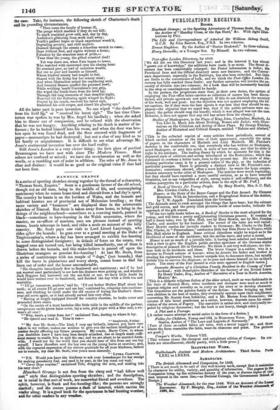HAWBUCK GRANGE
Is a series of sporting sketches strung together by the thread of a character, " Thomas Scott, Esquire." Scott is a gentleman farmer of the old school, though not an old man, being in the middle of life, and contemplating matrimony when he comes home tired and distrait from a bad day's sport. The country he hunts is on the borders of Wales, and the hounds and habitual hunters are of provincial not of Meltonian breeding ; so that more variety and " humours " are displayed than in the aristocratic sketches of Nimrod. But Scott is taken away from home, to bring in the doings of the neighbourhood—sometimes to a coursing match, painted in black—sometimes to hare-hunting in the Welsh mountains, where the master, an ex-officer of marines, uses sea phrases instead of sporting terms, hunts telescope in hand, and rides a mule on account of the hilly country. Mr. Scott pays one visit to Lord Lionel Lazytongs, who rides after the hounds : he goes over to a grand meeting at the Duke of Tergiversation's, where a day has been arranged to exhibit fox-hunting to some distinguished foreigners ; in default of foxes on the estate, two bagged ones are turned out, but being killed immediately, one of them is drawn before the hounds, and this make-believe is passed off upon the illustrious strangers as genuine fox-hunting! At last Mr. Scott, from a series of contretemps with ten couple of "dogs," (not hounds,) that kill the hares in plantations and worry sheep, comes home to find his linen out of order and the house uncomfortable.
"His thoughts immediately flew to Snailswell and matrimony; and if he had not wanted most particularly to see how his drainers were getting on, and whether Jack Hoggers had harrowed out the oat-field or not, we have little doubt he would have trotted over to Snailsweil, and finished the day with a little tea and courtship. " go tomorrow, anyhow,' said he. not bother Mother Bluff about her teeth; at all events Fli go over and see her,' ' continued he, relapsing into cautious- ness, and thinking he could make the old excuse of trying the brother's three- year-old "Having
r-oldserve again, as ithad already served him very often. at length equipped himself for country exercise, he broke cover and proceeded down stairs.
"On the centre of a most bachelor-like little table in the middle of the parlour, conspicuous on the green baize cover, lay a note, pink paper with a blue seal, a wo- man a all over I "'Why, here's a letter from her!' exclaimed Tom, darting to where it lay. "He opened and read it. Thus it ran- "' Snailswen, Friday.
" 'My dear Mr. Scott—The kind, I may say fatherly, interest you have ever taken in my welfare, makes me anxious to give you the earliest intelligence of a matter deeply affecting my future prospects. My cousin, Harry Crow, to whom you doubtless know I have long been deeply attached, has at length made suffi- cient money to enable him to quit the sea; and we are about to be married forth- with. I would not for the world that you should hear of this from any one but myself. I have therefore sent the boy over on the young horse at exercise; and, with the repeated expression of my sincere gratitude for all your kindness, believe me to remain, my dear Mr. Scott, ever yours most sincerely, LYDIA CLis-rozr. "' P.S. Would you have the kindness to ask your housekeeper for her receipt for making gooseberry fool, and send it by post, as the boy mast not wait.' "` Curse those cousins!' exclaimed Tom, dropping the note, and sinking into his easy chair."
Hamlnick Grange is not free from the slang and " hail fellow well met" style that distinguishes sporting sketches ; and the descriptions, as is usual in that sort of work, are somewhat literal and overdone. The spirit, however, is frank and fox-hunting-like ; the persons are strongly marked ; and the scenes possess a dash of interest, which carries the reader along. It is a good book for the sportsman in bad bunting weather, and for other readers in any weather.


























 Previous page
Previous page